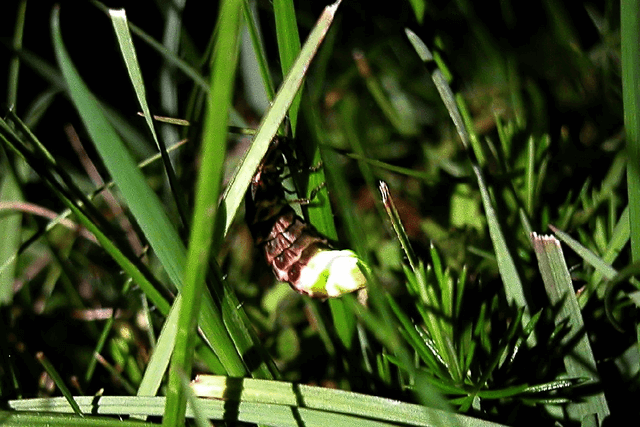
A new initiative by the London Wildlife Trust seeks to enlist volunteers and enthusiasts to both count and safeguard glowworms, whose females emit a remarkable bright green bioluminescent signal to allure their male counterparts.
The London Wildlife Trust has embarked on a multifaceted endeavour, aiming to gain a better understanding of the locations where glowworms (scientifically known as Lampyris noctiluca) persist within the city. Concurrently, they are conducting a captive-breeding experiment with the hope of bolstering their numbers at identified sites.
The revelation of unexpected glowworm strongholds in various corners of the city came as a pleasant surprise during the initial research. These strongholds include a railway embankment in Hornchurch in the east, the chalk downland of Hutchinson’s Bank in the south, and several other sites in the western borough of Hillingdon.
Nevertheless, the survival of these captivating insects hangs in the balance due to the proliferation of LED lighting and urban development on previously untouched land within the city. LED lights pose a significant threat as they render the glowing females nearly invisible to the males, disrupting their mating rituals. Additionally, habitat loss contributes to their decline, with glowworms favouring calcium-rich grasslands where snails and mollusks abound—vital prey for their voracious larvae.
“Seeing bioluminescence in London is quite bizarre, it’s almost otherworldly,” said Matthew Frith, of London Wildlife Trust. “The fact that there is a small but diverse group of animals sharing our world that have the ability to generate light – it’s like magic. It’s a chemical reaction that’s strange and wonderful.”
Global warming compounds the challenges faced by glowworms as droughts reduce the abundance of snails, further exacerbating the difficulty of finding sustenance. To combat this plight, the Wild Lights of London project aims to uncover the elusive beetles’ remaining sanctuaries, with a call for volunteers to assist in locating both adults and larvae. Glowworms endure in their larval stage for a span of two to four years.
Should the trust succeed in locating an ample number of larvae, they plan to temporarily house and rear them for subsequent release into their natural habitats, while also considering educational opportunities by showcasing these captivating insects to schoolchildren. This endeavour serves as a beacon of hope in the face of adversity, offering a chance for these glowing wonders to persist in the ever-changing urban landscape of London.
“We hope to get to having some glowing females in captivity as an educational resource to inspire awe and wonder but we don’t want to prevent any glowing females from being mated in the wild,” said Frith.
“The bottom line is to get a better picture of their distribution and abundance around London. We think there are places in London where we should be pushing for less artificial light to benefit glowworms and other nocturnal species and also give urban people the opportunity to see the night sky.”
——————————————————————————
At Natural World Fund, we are passionate about stopping the decline in our wildlife.
The decline in our wildlife is shocking and frightening. Without much more support, many of the animals we know and love will continue in their decline towards extinction.
When you help to restore a patch of degraded land through rewilding to forests, meadows, or wetlands, you have a massive impact on the biodiversity at a local level. You give animals a home and food that they otherwise would not have had, and it has a positive snowball effect on the food chain.
We are convinced that this is much better for the UK than growing lots of fast-growing coniferous trees, solely to remove carbon, that don’t actually help our animals to thrive.
This is why we stand for restoring nature in the UK through responsible rewilding. For us, it is the right thing to do. Let’s do what’s right for nature!
Donate today at https://naturalworldfund.com/ and join in the solution!

